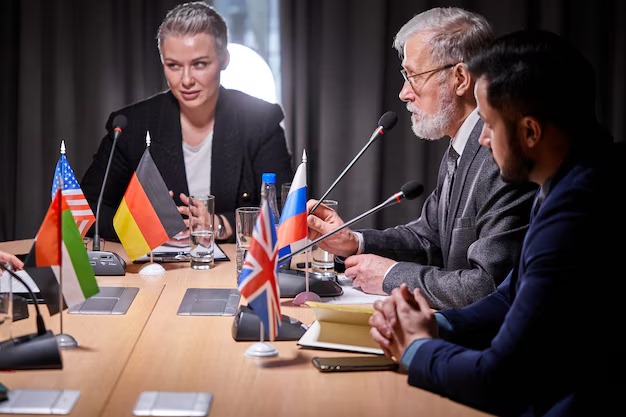India is changing its foreign policy and defence policy while gearing up to take its place at the center of global politics. Today, India is the world’s largest democracy and an emerging economic power. The acts of India, whether in terms of strategic diplomacy or strong defense reforms, strengthen leadership in the development of an inclusive, progressive, and safe multipolar world.
Strengthening Foreign Relations: A Strategic Imperative
The heart of Indian foreign policy lies in its unrelenting commitment to regional and global partnerships. All outreach diplomacy by the country is founded on the ‘Neighbourhood First Policy’, ‘Act East Policy’, ‘Think West Policy’, and ‘Connect Central Asia Policy’ that are together reaching out to friends and potential partners. The Security and Growth for All in the Region initiative, SAGAR, itself symbolizes India’s strategic focus towards maritime cooperation and stability in the region.
India, with a solid footing in multilateral forums like BRICS, SCO, and Quad, has taken the lead to pioneer institutions like ISA, CDRI, and the IMEC. This further strengthens its position as a leader in global governance. These efforts further enhance India’s influence and diplomacy but significantly support economic growth, sustainable development, and the sharing of technology.
Deepening ASEAN Ties: The Backbone of ‘Act East’
Engagement with ASEAN has been the very heart of India’s Act East Policy. It transformed from a Sectoral Dialogue Partner in 1992 to becoming a Comprehensive Strategic Partnership in 2022. Gradually, deepening ties can be seen in India’s involvement in ASEAN-led frameworks like the East Asia Summit (EAS), the ASEAN Regional Forum (ARF), and the ASEAN Defence Ministers Meeting-Plus (ADMM-Plus). India then reiterates the commitments toward peace, economic integration, and security of the high seas in the Indo-Pacific through cooperation in these associations.
G20 Leadership: The Voice of Global South
The G20 Presidency from India between 2022-2023 was one such crucial point on India’s journey that helped its foreign policy deliver on its aim of voicing the Global South. New Delhi G20 Leaders’ Declaration-unanimously adopted reflects this turning point through:
- Accelerated attainment of the Sustainable Development Goals (SDGs)
- Promotion of green development through the Lifestyle for Environment (LiFE) initiative
- Reforming multilateral institutions for the 21st century
- Accelerating technological transformation through digital public infrastructure
- Support for women-led development
- The Establishment of the Global Biofuels Alliance and IMEC under India’s presidency places yet another feather in the cap of energy security and global connectivity in infrastructure.
Defence Modernization: A ‘Year of Reforms’
As India expands its diplomatic outreach, it is equally committed to the technological developments of any form of defense force; towards this, Raksha Mantri Shri Rajnath Singh has declared 2025 as the ‘Year of Reforms’ while overhauling modernization for Indian armed forces.
Reforms are planned along the following domains:
- Jointness & Integration: Integrated Theatre Commands to ensure Inter-Service Coordination end.
- Emerging Technologies: Enhance Capabilities in cyber, Space, AI, Machine Learning, Hypersonics, and Robotics to change modernized Warfighting.
- Acquisition Reforms: Make Defence Procurement Smoother; Speed the Building of Defence Capabilities.
- Public-Private Collaboration: Expand Technology Transfer from Defence to Commercial Industry. Reinforce Make in India.
- Global Defence Exports: The nation emerges as a trusted exporter of defence products and ties up with global OEMs.
- Veteran welfare & Civil Military Coordination: Optimum use of welfare schemes for veterans by having greater integration of civil authorities with the armed forces.
Reforms
This is no mere restructuring; it is future-proofing a model to safeguard India from the nature of the change in the world at large to strengthen self-reliance along with co-innovations in-house under global collaboration. Well, this puts India at the forefront as an emerging potent force of the 21st century for power structures of the 21st.
Conclusion: A Resilient Future-A Vision for India
Given these facts, where India navigates its own map through the mess of geopolitics and security complexes globally, their foreign policy stands dynamic and thus the country transforms its defense policy, transforming actually the leader themselves, finding self at the center of this transformative process, through clear vision backed by powerful and effective policy implementations leading to decisiveness.
This is in defense and deepening of global alliances; this is the marker on the journey that ensures that India continues as a strong pillar in the new order, an order that is both stable, innovative, and strong.
About the Author
Mr. Bajaj holds the position of Group Director for CAD at the Aditya Birla Group and serves as a Board Member at Living Media, affiliated with the India Today Group. He brings a wealth of leadership experience, having formerly been the Director at Essar Group. Mr. Bajaj is recognized for his strategic insights and a strong commitment to innovation.

